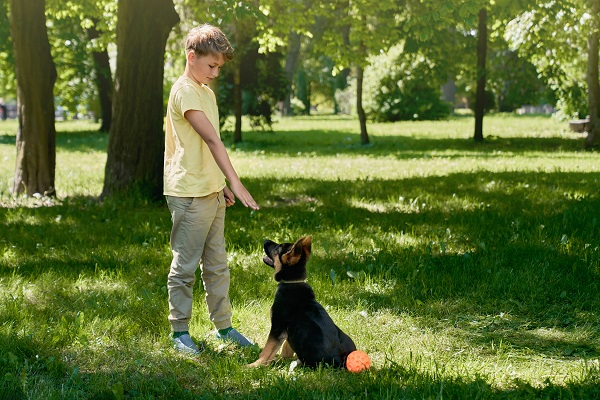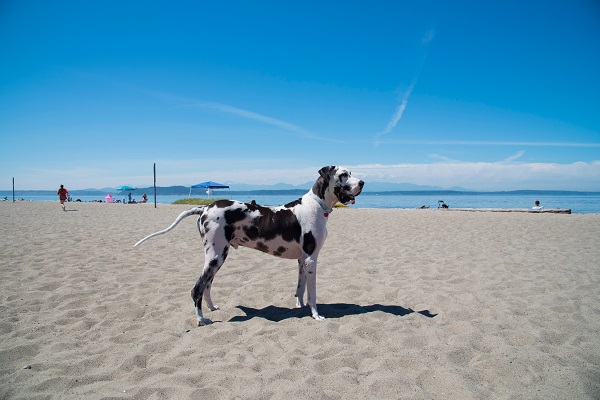Bringing a new furry friend home can be a wonderful addition to your family. It includes playing, loving, and cuddling with your new pup. But, apart from these, teaching your pup the essentials of potty etiquette is a task that is usually daunting as a part of its training.
However, with consistency and patience, you can potty-train your pup and go a long way toward living happily together. You must train your dog in essential potty etiquette, as it improves the dog’s health and strengthens the relationship between you and your pup.
How much time a puppy requires to be potty trained
The exact duration of the potty training you should provide to your pup can be determined based on its personality and ability. The duration of the potty training you should provide to your pup can be determined based on its personality and behavior.
Stubborn puppies usually take more time to potty train properly. However, potty training can be an easy thing with the right level of commitment and patience. Generally, a puppy takes 4 to 6 months to train fully. However, depending on the pup’s size, it may take longer.
Why is your pup not responding?
Like a human kid, potty training is an essential milestone for a puppy. It can be time-consuming and difficult for your puppy to grow and learn. Some people note that their puppy isn’t responding to potty training.
Normally, a puppy can take between two to four months to learn potty training, but in some cases, it can be quicker or slower. It would be best if you gave your dog the necessary time to your pup for essential potty training, whether it takes one month or six months.
You can also check for potential mistakes that may impact the process. For example, using ammonia-based cleaners can fail to crate-train your puppy. You can also provide your puppy with a consistent potty routine.
Eight Tips to potty train your puppy
Here are some most important tips that may help you potty train your puppy:
1. Maintain a routine
Potty training is essential for the dog’s digestive system to remain healthy, especially for young puppies. If your puppy cannot reliably predict when to go outside to potty, it will be less incentivized to hold it in.
You should take your puppy for a potty break every one to two hours, which will help your puppy develop a potty routine. Moreover, as they grow and their bodies change, the need for potty breaks will significantly lessen.
2. Eliminate anxiety or health issues
Not responding to potty training can also be a reason for some possible anxiety or health issues. As a responsible owner, you should eliminate the possibility of your pup experiencing anxiety or health issues.
There are a few medical problems that can arise at a young age and cause potty issues, including:
- Bladder or kidney stones
- Urinary Tract Infection
- Liver disease
- Parasites
3. Teach commands
Teaching your stubborn puppy the necessary potty training can be easy with a ‘go potty’ command or similar help to simplify the process. You can use these commands in a neutral and calm voice to avoid disruption and even repeat the command and reinforce your puppy.
4. Provide crate training
It is an essential step for your puppy’s potty training: limiting their access to the house. Always keep their crate on solid flooring, not carpets or rugs. The crate should be large enough for their comfort so that they can stand, sit, lie down, and stretch out easily.
For the first four months of your puppy’s age, you can leave it in the crate for one hour or a maximum of four hours. Since your puppy won’t want to soil its comfortable area, it will learn about its potty needs and how to control them.
5. Reinforce positively
Reinforcing your dog can be the best way to establish great potty etiquette. You can offer your dog a treat or praise it after the puppy finishes going potty to make it aware that it is necessary. Try to hide the treats until your puppy is done with the process, or even try to give a treat after an interval. It helps your dog associate potty training with the process instead of with treats!
6. Spay or Neuter
If you are going through a bad habit in your puppy of urinating in the home, then you should get them spayed or neutered. A dog with uncontrolled hormones that haven’t been spayed or neutered can be prone to anxiety and a compulsion to “mark” the house as its territory. It can be solved with the help of a vet, so you should take your puppy to your vet when you notice these signs.
7. Use Pet-Friendly Cleaners
When looking at the mistakes made while potty training, one of the most common is using ammonia-based cleaners on your pup, it is not detectable by humans and causes puppies to think the entire house is a toilet.
8. Avoid using a puppy pad
A puppy pad can be a helpful thing for your dog. However, it is not suggested for use while your pup is potty training. Puppy pads can help to ensure your puppy does not concentrate in one area of the house and learn to go outside for the potty. You can keep a pee pad for emergencies and try to stick your dog with a reliable routine to help it know that peeing is for outdoors only.
Frequently asked questions
-
What to do if your puppy just won’t potty train?
If you are facing issues with your dog’s potty training, you should have consistency with your daily routine, including sleeping, eating, and potty breaks. Consistency can be a key factor when trying to potty-train your dog in-house, as it helps your dog learn with repeated actions and rewards.
-
How many hours after eating does a puppy poop?
Most of the time, puppies eat three to four times a day as they grow and usually require a potty break after each meal. Younger dogs can wait approximately 20 minutes after a meal for a potty break. If your puppy is young, you should take it out as soon as possible after a meal.
-
What is the best dog potty training method?
Frequently, take your puppy outside for at least two hours immediately after they wake up, after eating or drinking, and after playing. Choose a toilet spot and take your puppy to that spot always.
-
What age is best to potty train a puppy?
Various dog-care experts recommend that puppy house training begin between 12 and 16 weeks old. At this age, they have their bladder controlled enough and bowel movements to learn to hold it.
Conclusion
With patience and the right consistency, you can teach your puppy proper potty etiquette, regardless of its stubborn nature. You will need to prioritize a predictable routine and positive reinforcement during the training for your dog, as it is young and learning. Moreover, it might be a challenging thing to do in the initial days. However, as your puppy grows and adapts to the routine, it has become well-maintained.

 DogExpress
DogExpress


















 in Chandigarh, India.
in Chandigarh, India. 
